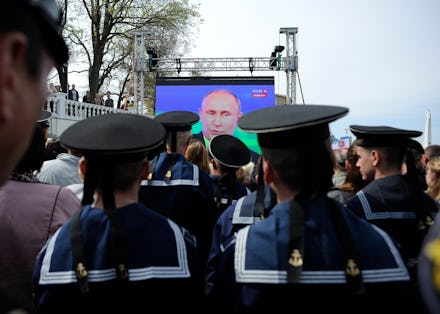Were Jews in Ukraine Really Just Asked to Register Their Identities? Here's the Real Story

The latest rumor to make its rounds on the web is a tip from the Jerusalem Post that in Donetsk, Ukraine, Jews older than 16 years old will be forced to register their identities with the pro-Russian separatists led by Denis Pushilin, whose forces have recently taken over several government buildings in the city. This is actually just a provocation most likely planted by pro-Ukrainian groups.
Rain, an independent TV station in Russia, quoted Pushilin as saying the documents did not come from him. Some people from the local Jewish community agreed documents were an attempt to provoke a conflict and blame it on Pushilin and his separatists, according to the Ukrainian news publication the News of Donbass.
To set the record straight: Jews in Ukraine are not being asked to register with pro-Russian separatists at risk of losing citizenship. This war of information, however, might not be ending anytime soon.
President Vladimir Putin ramped up his aggressive language toward Southeastern Ukraine in his four-hour live Q&A session Thursday, when people called in, texted and sent video messages with their questions. He has made it more obvious that his priorities are protecting ethnic Russians over helping Ukraine become more stable.
We can see this in his increasingly pro-Russian language. Putin publicly called the Southeast Ukraine, which is bordered by Moldova, Donetsk, Odessa and Dnepropetrovsk "Novorossiya" or "New Russia" for the first time. In other words, he made it clear this region is now rightfully a new kind of Russia and should be treated as such. The area was last called "New Russia" in 1922 when it was "given" to Ukraine by the Bolsheviks. "God knows why" they gave these cities to Ukraine, Putin said Thursday.
The "New Russia" label is particularly scary when coupled with the way Putin is attempting to divide Russia from the West. Putin described the western man as being "for himself," and "the more successful the person, the better." He distinguished this from a "person of the Russian world" who thinks there is "something higher" of his own life. The more Putin creates these juxtaposition, the more like it seems he is not going to let down on Ukraine.
Sure, U.S. Secretary of State John Kerry and his Russian counterparts agreed on a de-escalation resolution Thursday in Geneva. But as is clear in Putin's rhetoric: If it's up to him — and it might just be — Ukraine is New Russia."
As Putin increases his anti-fascist, pro-Russian rhetoric, he renders the Ukrainian government weak, further destabilizing the country. That's why local Ukrainian groups in Donetsk resorted to faking an anti-Semitic document on the part of pro-Russian separatists.
If Putin doesn't put a halt to elevating the interests of ethnic Russians over the interest of all Ukrainians, more members of the international community invested in this conflict will be blinded by his war of misinformation.